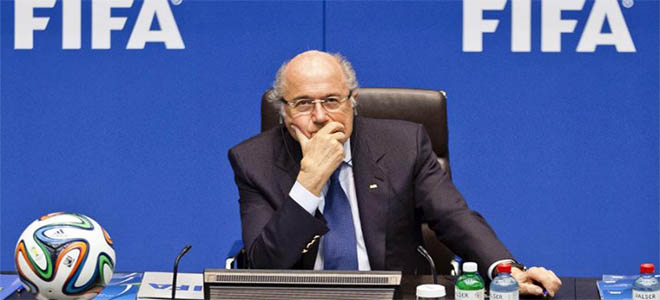The world’s governing body of soccer is reeling from a scandal involving the next two World Cups in Russia and Qatar. But making it accountable will take more than an investigation.
Foreign Policy
November 16, 2014
by Roger Pielke, Jr.
Fans of American football have weathered a season of scandal, with claims of willfully disregarding knowledge of concussion damage and a culture of domestic abuse battering the National Football League’s top officials. But nothing comes close to the hailstorm that surrounds the Fédération Internationale de Football Association (FIFA), the Swiss-based non-profit that oversees international soccer, including the quadrennial World Cup finals. Since 2010, the organization has found itself buried in an avalanche of allegations of corruption, notably surrounding how it awarded the 2018 and 2022 World Cups to Russia and Qatar.
On Wednesday, Nov. 12, FIFA released summary results of its internal investigation into the various allegations, and to the surprise of no one, found the 2018 and 2022 World Cup decisions to be “well-thought, robust, and professional.” Despite uncovering a litany of dodgy episodes and running into investigatory obstacles, such as destroyed computers from the Russian delegation, FIFA concluded that “the various incidents which might have occurred are not suited to compromise the integrity of the FIFA World Cup 2018/2022 bidding process as a whole.” In other words, this is basically par for the course.
In many ways it is: Since October 2010, when the Sunday Times successfully pulled off a sting of FIFA Executive Committee members accepting bribes in exchange for their votes in the World Cup bidding process, it has been fairly obvious to even casual observers that something was very wrong inside international soccer’s governing body. FIFA has also been criticized for its inaction over alleged human rights violations in Qatar, associated with the building of stadiums for the 2022 World Cup. And it has steadfastly supported Russia during the ongoing international concerns over its invasion and appropriation of parts of Ukraine. FIFA issued an apology last week for showing a promotional video of the 2018 World Cup that included Crimea as a part of Russia. (In addition to taking territory, Russia has also absorbed Crimean professional soccer teams into its domestic league.) UEFA, the Union of European Football Associations (itself a subset of FIFA) has declared that it will not recognize the results of Crimean clubs within the Russian league. So routine are allegations of impropriety that the general public seems no longer surprised by the chicanery; it’s top executive, the long-serving autocrat Sepp Blatter, would lose badly to Dr. Evil in a popularity contest but still manages to keep an iron grip on power.
But perhaps this scandal is different. One British MP called it a “whitewash.” Greg Dyke, the chairman of Britain’s Football Association, went further: “I don’t think Fifa is a straight organisation and hasn’t been for many years,” he said on television. And then, in a plot twist worthy of an episode of House of Cards, no reaction to this week’s FIFA announcement was more surprising than that of Michael Garcia, the U.S. investigator who was appointed by FIFA itself to prepare the 430-page investigatory report (which is being closely held by FIFA). Upon FIFA’s release of its internal conclusion on the integrity of the World Cup bidding process, Garcia said that the summary of his investigation contained “numerous materially incomplete and erroneous representations of the facts.” The president of the Bundesliga, the German soccer league, has already put forward the unthinkable — that UEFA might leave FIFA if Garcia’s report is not released in full. Read more …


